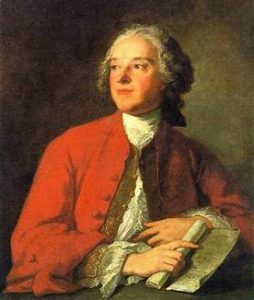Cornelius de Pauw
Patriarchs and Longevity
The Patriarchs referred to in Genesis and their seemingly exaggerated longevity has been a source of continuous debate ever since biblical criticism developed in the 18th century. Cornelius de Pauw referred to the apparently exaggerated life spans of the biblical patriarchs explaining that it was widespread in the Middle East and further afield to name a dynasty or family after its founder and attribute the total years of its reign to that founder. [1756.258]
Before dePauw, Pierre-Daniel Huet expressed similar views to Samuel Borchart, linking the biblical patriarchs and the story of Atlantis in his Demonstratio Evangelica [1007]. >Atlantology’s interest in the apparent longevity of the patriarchs stems from the difficulty created by Plato’s insistence that Atlantis was at war with Athens and Egypt 9,000 years before Solon’s visit to Egypt. This idea defies reason as neither state existed until many millennia later. An astounding number of attempts to reconcile this large discrepancy are on offer (See Dating Atlantis).<
Stephen E. Jones has published an interesting paper in 2005, whose investigation led him to conclude “there is no real conflict on this matter between the Bible and science nor between the Bible and itself”(i). Carol A. Hill has written a paper, Making Sense of the Numbers of Genesis, also intended to reconcile the Ages of the biblical patriarchs and science(j) as was a paper by Jim Stump(k).
Lee Mckague has suggested that there may be a biological explanation for the longevity of the biblical patriarchs(h)!
Emilio Spedicato in a paper(f) entitled Large Numbers in Asian Chronology Decrypted includes some radical ideas on how to resolve the mystery of the ages of the patriarchs recorded in the Bible. He also expanded on his ideas regarding large numbers in ancient chronologies with a paper(l) in which he considers “large numbers in days, not in years, that appear in Mesoamerican Mayan and Toltecs chronologies. We show how such numbers, when reduced to years under some hypotheses, provide important information for a period extending over several thousand years BC, related to catastrophic events on our planet and to a special event in the solar system.”
A paper(a) by an unnamed and apparently deceased author was published by Duane L. Christensen. It approaches the ages of the patriarchs from a numerological standpoint with some curious conclusions. I’m wary of all such occult claims but will leave it to readers to decide.
>Over a century ago, George H. Cooper offered the simplistic suggestion that the great ages of the patriarchs recorded in the Bible was the result of confusing lunar cycles with solar years [236.232]!<
Zoltan Simon has claimed that the ages of the patriarchs were calculated using 90-day ‘years’ [0549.7].
Another paper by Dean Talboys, entitled Methuselah Debunked(b)(c)(d) offers a convoluted explanation for the ages based on Babylonian astronomy/astrology.
Philip Coppens has also touched on a possible astronomical explanation for the patriarchal numbers(g).
In one(e) of his many papers on ancient chronology, Gérard Gertoux he controversially touches on subjects such as radiocarbon dating, the age of the patriarchs, the Ice Ages, evolution and more.
>Readers interested in the attempts to explain the apparently inflated ages of the patriarchs might be interested in a paper on the biologos website where it proposes that “One option is attaching some significance to the fact that all of the 30 numbers can be expressed as combinations of the two “sacred” numbers 60 and 7 in terms of years and months. 60 was culturally significant because it was the number that Babylonian mathematics was based on (the influence of this sexagesimal system is still felt today with our 60 minutes per hour and 60 seconds per minute). And 7, of course, has a prominent place in biblical symbolism beginning with the Sabbath. So when we’re told that Methuselah was 187 years when he had his son Lamech (Gen. 5:25), we can see that 187 = 60+60+60+7 years. And then because 60 months = 5 years, when Adam is said to be 130 years at the birth of his son Seth (Gen. 5:3), that can be expressed as (60+60 years) + (60+60 months).” (m)<
(a) https://jbburnett.com/resources/ot/christensen-patr-ages.pdf
(e) https://www.academia.edu/17026643/Noah_and_the_Deluge_Chronological_Historical_and_Archaeological_Evidence (around one-third of the page down)
(f) Migration & Diffusion (migration-diffusion.info)
(g) https://www.eyeofthepsychic.com/genesis5/
(h) https://www.researchgate.net/publication/253528140_Methuselah_Oldest_Myth_or_Oldest_Man
(i) Stephen E. Jones: Projects: The ages of the patriarchs in Genesis 5 and 11 (archive.org)
(j) https://www.asa3.org/ASA/PSCF/2003/PSCF12-03Hill.pdf
(k) https://biologos.org/articles/long-life-spans-in-genesis-literal-or-symbolic
(m) Long Life Spans in Genesis: Literal or Symbolic? – BioLogos *
de Pauw, Cornelius
Cornelius de Pauw (1739-1799) was a Dutch geographer and philosopher, who, although he never visited the continent, was  considered a leading expert on America and in that capacity, he was a contributor to Diderot’s Encyclopédie. In a 1768 book[1305]+ he claimed that the location of Atlantis had been in Central America.
considered a leading expert on America and in that capacity, he was a contributor to Diderot’s Encyclopédie. In a 1768 book[1305]+ he claimed that the location of Atlantis had been in Central America.
DePauw cites Pliny to explain the Egyptian habit of counting lunar cycles as ‘years’.
He also referred to the apparently exaggerated lifespans of the biblical patriarchs explaining that it was widespread in the Middle East, and further afield, to name a dynasty or family after its founder and attribute the total years of its reign to that founder.[1576.258]
[1305]+ https://archive.org/details/recherchesphilo00conggoog * (French)
[1576]+ https://archive.org/details/philosophicaldi00thomgoog * (French)
